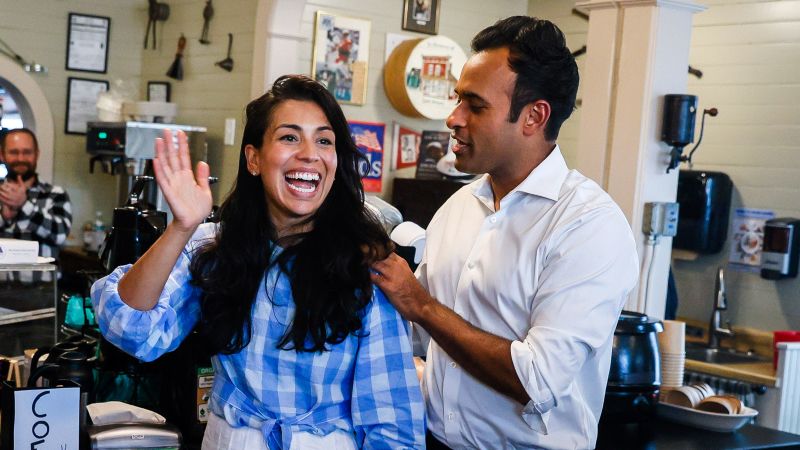Apoorva Ramaswamy, wife of Republican presidential candidate Vivek Ramaswamy, said she does not regret taking the Covid-19 vaccine, breaking with her husband on a central issue of the biotech entrepreneur’s outsider campaign thus far.
Ramaswamy, a throat cancer surgeon at Ohio State University, told NBC News that said she would take the Covid vaccine again if given the chance, stressing the importance of being vaccinated while treating her patients. She also emphasized the importance of “autonomy” in recommending medical treatments to her patients and said her decision to take the vaccine was different for her than for her “young, healthy husband.”
“For every person, that’s a different decision. So for my young, healthy husband, that’s a different decision than for me when I am taking care of patients who are cancer survivors, and they trust me to, you know, be in their airway every day,” she said in an interview released Monday. “It’s a very different discussion. And I think giving people that autonomy is the most important part.”
Her view on the vaccine differs from that of her husband, who has previously said he regrets taking the Covid vaccine and has repeatedly lambasted the federal government’s efforts to produce and distribute the vaccine, arguing that the government lied about its efficacy and its possible side effects.
In a podcast interview in July, Ramaswamy said he is vaccinated against Covid but regrets taking it in light of information he’s learned about the vaccine since taking it. Tricia McLaughlin, a spokesperson for the Ramaswamy campaign, confirmed he has taken the vaccine and regrets doing so.
“If Vivek had the information in 2021 that he has now, yes, he would have made a different medical decision,” McLaughlin told CNN.
The split between the couple draws into focus the campaign’s handling of an important issue for Republican primary voters, many of whom reacted negatively to state and federal rules around wearing masks, self-quarantining and taking vaccines during the Covid pandemic. Ramaswamy has sought to align himself with those voters at campaign events in Iowa and New Hampshire. He has said he’s against any mask mandates, vaccine mandates or lockdowns, pledged to remove liability protections for vaccine manufacturers, called for “accountability” for prominent public health officials like Dr. Anthony Fauci, who advocated for the vaccine.
Ramaswamy has also advanced conspiracy theories about the origins of Covid, the impacts of the Covid vaccine and the federal government’s level of knowledge about the vaccine’s impact.
“It’s not principles of logic. It’s a new religion, it’s a cult. In this case, it was a cult of Covid-ism in this country,” Ramaswamy said of the federal government mandates during the Covid pandemic at a campaign event in Newport, New Hampshire, earlier this month.
But Ramaswamy’s past comments around Covid and his background working with the pharmaceutical industry have raised questions about whether he’s sufficiently opposed to the vaccine manufacturing industry. In 2020, he said on social media that a proposal by Vermont Sen. Bernie Sanders to deliver masks to all Americans “strikes me as a sensible idea” and that “wearing a mask = personal responsibility.”
Voters at campaign events have also expressed skepticism about his previous work developing and selling new drugs as the founder of biotech firm Roivant Sciences. Ramaswamy oversaw the development of five FDA-approved medicines as head of Roivant before stepping down as CEO in 2021, rising to prominence during that time for working on a highly-publicized drug to cure Alzheimer’s disease that ultimately failed its clinical trial.
“Here’s my thing– you come from what we fear, right? You come from the pharmaceutical industry,” New Hampshire native Bill Gay asked Ramaswamy at a Lancaster, New Hampshire, campaign event earlier this month. “What do you say when people say ‘Hey you’re a product of big pharma, you’re a product of the Ivy League?’ Why should I trust you?”
“I have seen the corruption front row,” Ramaswamy responded, arguing challenges caused by government regulation slowed the development of drugs he said could have saved lives.
Read the full article here





